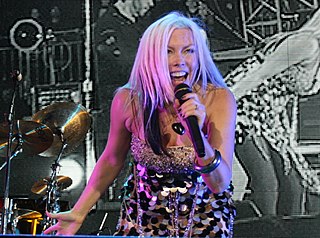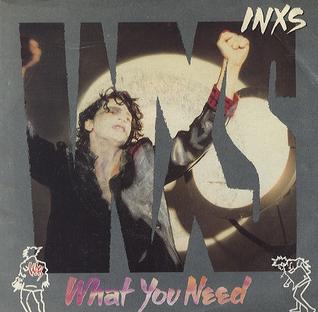Birdy or Birdie may refer to:
Iron Man, Ironman or Ironmen may refer to:

Wang Chung is an English new wave band, formed in London in 1980 by Nick Feldman, Jack Hues and Darren Costin. The name Wang Chung is Chinese, meaning "yellow bell" in English, and is the first note in the Chinese classical music scale. The band found their greatest success in the US, with five top 40 hits there, all charting between 1983 and 1987, including "Dance Hall Days", "Everybody Have Fun Tonight" and "Let's Go!".

To Live and Die in L.A. is a 1985 American neo-noir action crime thriller film directed and co-written by William Friedkin and based on the 1984 novel by former United States Secret Service agent Gerald Petievich, who co-wrote the screenplay with Friedkin. The film features William Petersen, Willem Dafoe and John Pankow among others. Wang Chung composed and performed the original music soundtrack. The film tells the story of the lengths to which two Secret Service agents go to arrest a counterfeiter.

Terri Kathleen Nunn is an American singer and actress. She is known as the vocalist of the 1980s new wave and synth-pop band Berlin.
City of Angels may refer to:

"What You Need" is a song recorded by the Australian band INXS. It is the leadoff track from their 1985 album, Listen Like Thieves. "What You Need" was the lead single off the album in Australia and New Zealand, while it was in USA and Europe the second single after "This Time" and was the band's first American Top Ten hit, peaking at #5 on the Billboard Hot 100 singles chart.
Jeremy Allan Ryder, better known as Jack Hues, is an English singer, songwriter and musician who is best known for forming and fronting the 1980s English new wave band Wang Chung. Hues was also a member of the one-off band Strictly Inc.
Don't Let Go may refer to:
An alibi is a statement by a person, who is a possible perpetrator of a crime, of where they were at the time a particular offence was committed, which is somewhere other than where the crime took place.

"I Can't Live Without My Radio" is the lead single from LL Cool J's debut album, Radio. It was released in 1985 for Def Jam Recordings and was both written and produced by LL Cool J and Rick Rubin. It is a love song to the boombox. The song reached No. 15 on the Billboard R&B singles chart. "I Can't Live Without My Radio" was released with the follow-up single "I Can Give You More". It is the first Def Jam single distributed through Columbia Records.

"Dance Hall Days" is a song by the English new wave band Wang Chung. It was originally released as a single in 1982 when the band was called Huang Chung, then it was re-recorded and released a year later in 1983 for the studio album Points on the Curve. It was the band's only single to make the top 40 in the UK. In the US, it peaked at No. 16 on the Billboard Hot 100 and went to number one on the Dance Club Songs chart.

To Live and Die in L.A. is the third studio album by the English new wave band Wang Chung. It was released on 30 September 1985 by Geffen and is their first recording as a duo of lead vocalist Jack Hues and bassist Nick Feldman following the departure of drummer Darren Costin. The album served as the soundtrack for the 1985 film To Live and Die in L.A, directed by William Friedkin. Instead of following up the success that Points on the Curve (1983) had provided them, the band switched gears to produce an original motion picture soundtrack. The switch allowed for them to experiment with different styles of music from the more conventional pop music found on their previous studio album.

Everybody Wang Chung Tonight: Wang Chung's Greatest Hits is one of two compilations by Wang Chung. Released in the spring of 1997, this compilation contains all eight of the band's charted singles from 1984 through 1989.

"To Live and Die in L.A." is a single from the soundtrack of the same name by the English new wave band Wang Chung. Released on 25 September 1985, the song peaked on the Billboard Hot 100 at No. 41.

"Wait" is a single by English new wave band Wang Chung, released as the fourth and final single from their second studio album, Points on the Curve (1983). The single reached No. 87 on the UK Singles Chart. Aside from the early singles released as Huang Chung, "Wait" was the only single by Wang Chung that failed to chart on the US Billboard Hot 100. However, it peaked at No. 17 on the U.S. Billboard Hot Dance Club Play chart.

"Hypnotize Me" is a single by English new wave band Wang Chung, released on 5 May 1987 as the final single from their 1986 studio album, Mosaic. The single reached No. 36 on both US Billboard Hot 100 and the US Cashbox chart, their last US Top 40 to date.
Harvey Jay Mason Jr. is an American record producer, songwriter, film producer, and current CEO of The Recording Academy. He is known for producer and songwriter, he has collaborated with Aretha Franklin, Michael Jackson, Beyoncé, Justin Bieber and many more artists.

"You Only Live Twice", performed by Nancy Sinatra, is the theme song to the 1967 James Bond film of the same name. The music was by veteran Bond film composer John Barry, with lyrics by Leslie Bricusse. The song is widely recognized for its striking opening bars, featuring a simple 2-bar theme in the high octaves of the violins and lush harmonies from French horns. It is considered by some to be among the best James Bond theme songs, and has become one of Nancy Sinatra's best known hits. Shortly after Barry's production, Sinatra's producer Lee Hazlewood released a more guitar-based single version.

"Wake Up, Stop Dreaming" is the second single from the To Live and Die in L.A. soundtrack by the English new wave band Wang Chung. It was released in 1985 by Geffen Records.










